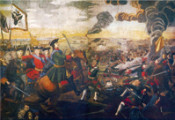
Battle of Poltava
And with them the royal guards
Agreed in smoke amid the plains:
And the fight broke out, Poltava battle!..
Sweden, Russian - tunic, chops, cuts.
fight drum, clicks, rasp,
The thunder of guns, poplar, neighing, moan,
And death and hell from all sides.
A. S. Pushkin. “Poltava”
On June 27 (July 8), 1709 in 6 verst of the town of Poltava in Little Russia (Left-bank Ukraine) took place the largest battle of the Northern War between Russia and Sweden which resulted in the defeat of the Swedish army of Karl XII. Since 1995, Russia has celebrated Military Glory Day on 10 July, to commemorate the victory of the Russian army led by Peter the Great at the Battle of Poltava in 1709 over the Swedish army.
In April of 1709 Swedish troops besieged the town of Poltava defended by a small garrison under the commandment of Colonel A. S. Kelin. Swedes attacked the fortress daily. In case the town was occupied, it was a threat to Voronezh, the key base of supply and formation of the Russian army.
In the end of May, 1709 the main forces of the Russian army led by Peter I approached the outskirts of Poltava. Russian army which numbered 42 000 men and 72 guns settled in a reinforced camp 5 km north of Poltava. Taking into account the experience obtained after the Battle under Lesnaya village the Russian army chose a small area surrounded by forest in order to hamper the maneuvers of the enemy. Peter I charged himself with the commandment of the first division; the commandment of other ones he distributed between generals. A. D. Menshikov was in charge of cavalry, Bruce was at the head of artillery.
From the Swedish side in the battle participated about 20 000 men and 4 guns (28 guns remained in the transport without ammunition). The rest of the troops (up to 10 000 men) including Zaporozhye and Ukrainian Cossacks led by hetman Mazepa stayed in reserved. Due to Karl’s XII wound the Swedish army was commanded by Field Marshal Rehnskiolt. Infantry and cavalry were led by Generals Lewenhaupt and Kreits respectively.
At 2 a.m. June 27 (July 8) the Swedish infantry moved towards Russian redoubts in 4 columns. It was followed by 6 cavalry columns. After stubborn 6-hour fighting, Swedes managed to take over just two advanced redoubts. Rehnskiolt, trying to turn Russian redoubts from the left side, made a regrouping of his troops, thus 6 battalions of the right flank and some squadrons of Generals Schlippenbakh and Ross were cut off from the main Swedish forces, withdrew to a forest to the north of Poltava where they were defeated by Menshikov’s cavalry.
Having broken through redoubts, the majority of Swedes found themselves under a heavy artillery and gun fire coming from the Russian camp and withdrew in disorder to Budische forest.
At night o’clock a hand-to-hand combat started. Being outnumbered, Swedes began to retreat and soon it was a flight. A detachment led by A. D. Menshikov was sent to pursuit the enemy. It cached up with Swedes near Dnieper’s die and forced the remaining of the Swedish army (16 000 men) led by A. D. Lewenhaupt to capitulate. Swedish king Karl XII and Ukrainian hetman Mazepa ran with a small detachment to the territory of Ottoman Empire.
During the battle of Poltava Swedes lost over 9 000 men killed and over 3 000 taken prisoners; as to the losses of Russians they were much lesser: 1 345 men killed and 3 290 wounded.
Russians were the first to apply earth fortification in war science of the age as well as a fast-moving horse artillery. The decisive victory of the Russian army in Poltava battle was a turning point in the course of the Northern War and ended the Swedish domination as the main military power in Europe. Russian annexed its ancient lands and firmly settled on the coasts of the Baltic Sea.
Lit.: Ассанович П. Л. Император Пётр Великий : Полтава. СПб., 1909; Богданович П. Н. Полтавская виктория. Буэнос Айрес, 1959; Борисов В. Е., Балтийский А. А., Носков А. А., Полтавская битва. 1709 — 27 июня 1909. Сб. ст. СПб., 1909; Дядиченко В. А. Полтавська битва. Киïв, 1962; Злаин А. И. Полтавская битва. М., 1988; Полтава. К 250-летию Полтавского сражения. Сб. ст. М., 1959; Тельпуховский Б. С. Северная война 1700—1721 гг. М., 1946.
Based on the Presidential Library’s materials:

